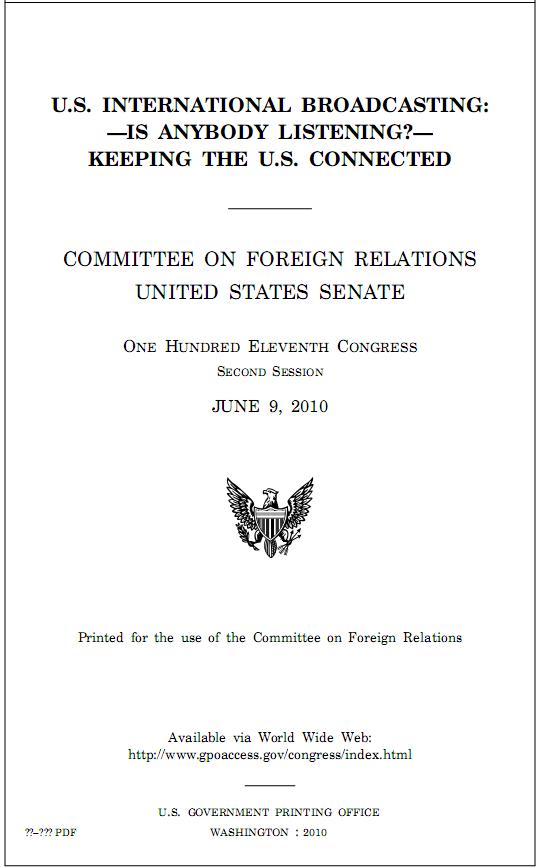Senate Report Questions BBG Structure and Continuation of Alhurra

WASHINGTON: Lawmakers may want to consider breaking up the Broadcasting Board of Governors and shutting down Alhurra, the international Arabic-language news channel funded by the United States. So states a report from the Senate Foreign Relations Committee. The report addresses upheaval at the BBG, formed in 1994 to manage U.S. broadcasting operations that include Voice of America, Alhurra and others.
“The average vacancy rate for a seat on board is more than 460 days. One seat has been vacant for more than four years,” the report says.
The president nominates board members, who are charged with maintaining the editorial independence of the various operations. The BBG has become increasingly politicized in recent years to the point where President Obama’s current nominations are stalled. Senate Republicans are critical of their lack of broadcasting experience, according to Foreign Policy. Sen. Tom Coburn (R-Okla.) asked in April that he be consulted before the nominees were confirmed by unanimous consent.
“I have longstanding concerns regarding the transparency and effectiveness of our taxpayer-funded international broadcasting agencies under the purview of the Broadcasting Board of Governors,” he wrote in a letter to Sen. Mitch McConnell (R-Ky.) obtained by Foreign Policy.
The Senate report, dated June 9 and signed by Ranking Committee Member Richard Lugar (R-Ind.), recommends confirming Obama’s nominees so the BBG can operate.
“Going forward, presidents should move with dispatch to fill vacancies and should prioritize nominees with substantial international broadcasting experience,” it states. “In the medium term, Congress must decide whether it is time to consider another management structure if board staffing difficulties persist.”
The report covers several issues affecting U.S. broadcast operations, including its reduction of shortwave radio frequencies. It questions the planned closure of the last shortwave facility on U.S. soil, located in Greenville, N.C. It also calls on Congress to revisit a 62-year-old law that prohibits U.S. government broadcasting within the United States.
“Today... Russia and China and other entities currently broadcast in English in the United States,” the report says. “Additionally, recent Arabic-speaking immigrants to the United States are able to watch Al Jazeera but prevented by Smith-Mundt from viewing Al Hurra. These realities, coupled with the rise of the Internet, which enables computer users in the U.S. to receive video and audio streams of BBG broadcasts and readily access BBG Web sites, demonstrate that aspects of the legislation are both anachronistic and potentially harmful.”
The report also notes how BBG operations are under increasing pressure from antagonistic political regimes and competing media. The Chinese government issued but two work visas for VOA correspondents in the last year and blocked the organization’s attempt to open a bureau in Shanghai. Yet China’s state-run Xinhau News has 75 correspondents in the United States, which issued 2,900 visas to Chinese journalists in the last year.
In Russia, the reports says journalists are “routinely abducted, tortured and murdered with virtual impunity.” BBG services in Russia have dwindled in the last few years, it says, and recommends intervention by the State Department.
Competition is trouncing Alhurra, the 24-hour Arabic-language news channel launched throughout the Middle East in 2004.
“Alhurra... is expensive, and with the exception of Iraq, little watched elsewhere in this vital region,” the report says. “Alhurra’s budget of some $90 million surpasses the combined budgets of Radio Free Asia ($37 million), Radio/TV Marti ($30 million) and VOA’s Persian NewsNetwork Television ($17 million). Given the crowded media environment of the Middle East, either greater resources must be devoted to marketing and promotion or additional programming changes must be enacted in pursuit of increasing the channel’s market share. Should these efforts fail to improve the overall viewership levels, policy makers will have to decide if continuing Alhurra’s operations is worth the costs.”
The 95-page report--“U.S. International Broadcasting: Is Anybody Listening?”--provides further details regarding Alhurra’s challenges and other issues plaguing the Broadcasting Board of Governors and its operations.
-- Deborah D. McAdams

Get the TV Tech Newsletter
The professional video industry's #1 source for news, trends and product and tech information. Sign up below.
